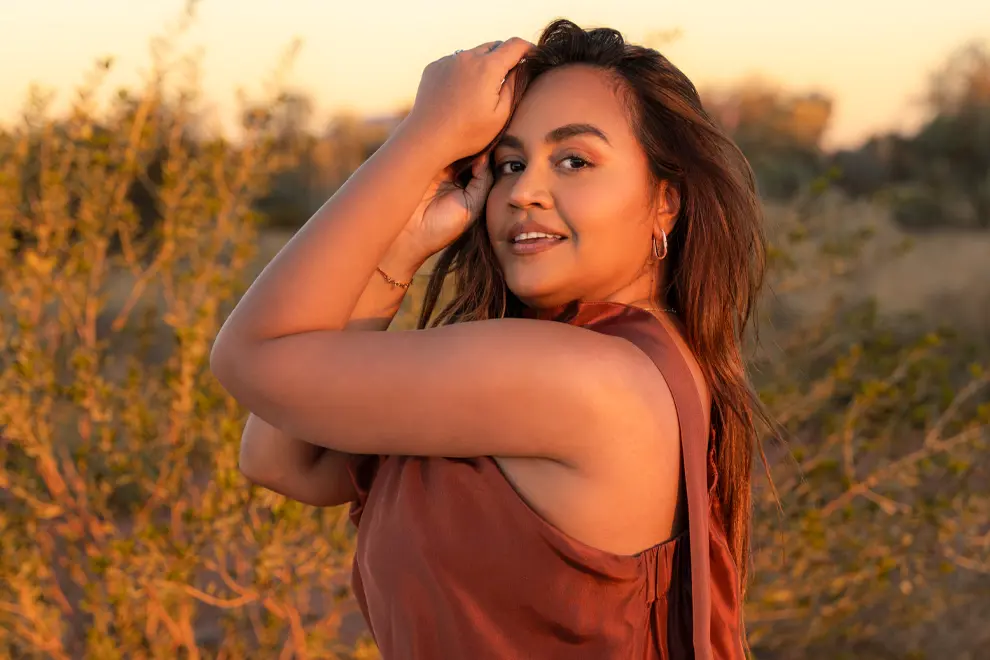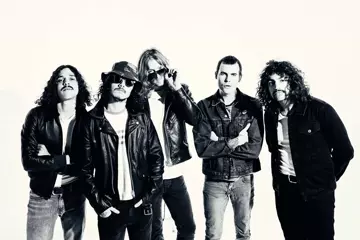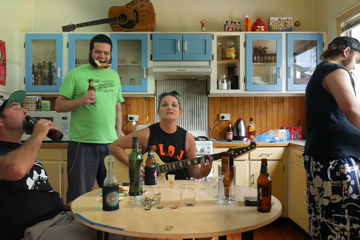 Jessica Mauboy
Jessica MauboyIs there really a space in the Australian music media that Jessica Mauboy can’t occupy?
It’s 20 years next year since her Australian Idol debut – which somehow it feels like a lifetime and no time at all – and since then she’s made five solo albums, represented us at Eurovision, casually dropped back to triple j, starred in film (The Sapphires and Bran Nue Dae), TV, and won awards, awards, and additional awards.
Next will be recognition by the National Indigenous Music Awards (NIMAs) with an induction into their Hall of Fame. Who else can mix in such varied circles with such apparent ease?
Mauboy is again doing something unexpected with her next musical move – going independent. Her new label Jamally is a way to give herself a new challenge, while also holding onto the creative and business strings to her own bow.
After almost five years, Mauboy has cut ties with Warner Music Australia—which she joined after over a decade at Sony—and is ready to follow her own path, do things her own way.
Don't miss a beat with our FREE daily newsletter
She said of the decision in a statement, “This is the start of a new chapter for me – not just as a singer or performer, but as a storyteller and businesswoman too.”
Now, Mauboy is fully in charge of her future releases, including the creative process, recording, releasing, and marketing music.
“Going indie was deliberate, and it was a combination of things,” Mauboy explains. “Given that I had given pretty much my whole music career to big record labels, and I really experienced that time, I know that time like the back of my han,d and I just know that process inside out.
“And I think, along the way, you understand and you realise the politics, you realise that it is a certain genre, and you release that it can be driven by money.
“I also it just feels like you're going kind of around in circles, and a lot of the time you're kind of waiting, like, ‘Waiting for what?” she laughs. “So there were multiple things, I guess, that I learned along the way that really educated me. I learned hard and fast.”
Mauboy falls short of direct criticism of a specific major or event. You could say this is a mark of her reputation as the nicest person in the Australian industry, but importantly, it shows her sharp intelligence.
The Industry and majors become the way they are by keeping a firm eye on business, and without money, a lot can’t happen. But when money is the main driver, it also means fences have to be drawn around certain things, and the myth of The Market needs to always be considered first.
“I think, most importantly, was probably representation. I grew up in a time where there wasn't a lot of First Nations music like the way that I was writing, or that sounded like me, or that would write like me – particularly in pop,” she explains.
“I really got my inspirations from Christine Anu, and then just watching, from a female point of view, artists like Deborah Mailman.
“And you know, those two women were obviously cultural women, First Nations women, who paved the pathway for me in terms of identity, power and strength to want to be in those spaces.”
While these guiding lights are clear, Mauboy is also clear that barriers remained as the commercial industry continued to expect her to just be a certain type of artist or performer. She does talk about feeling at times there were places that were “kind of untouchable in a way”, where she felt resistance. “You can’t go there, because [we] don't know if you know how to do it,” she recalls.
It’s a mistake that The Industry has made again and again when trying to keep artists in one lane against their passion – and like so many before her, Mauboy’s belief in her own ability (and bloody hard work) has proven any sceptics wrong.
“I'm a First Nations young woman, and immediately I'm placed in a kind of country-soul space. But, ‘No, I want more, I know I have it – let me experiment!’”
All of this is not to say that Mauboy’s relationship to country, soul or other mainstream genres is fraught or disrespectful. There is little chance of getting her to disrespect any type of music or any musician for that matter – again, a marker of intelligence and bloody good manners.
But the ability to make her own choice, rather than have someone else decide what kind of artist she will be, or where her music will be placed or contextualised, is Mauboy’s goal now.
“It's just something I've felt is natural and evolutionary in my career, and I guess that extension of independence and entrepreneurial spirit that I want to carry, that I've always had through, you know,” Mauboy says. “I've always had the passion and the desire for making music, and with all the other noise, it will come.
“I am just really focusing on being fair, being collaborative, because I work better that way. And I can have all that; it does exist!”
Recent collaborations for Mauboy include her work with the iconic 3% for the track Won’t Stop - a tune that broke such ground in terms of artistic and cultural influence and won numerous accolades.
Since then, her Like A Version collaboration with Barkaa on Yothu Yindi’s World Turning has also turned heads, not just for the way the artists worked together, but for the genuine respect each showed to the craft of working side by side rather than in competition.
Watch and listen without bouncing and crying, we dare you.
Now the first track for her nascent Jamally label is While I Got Time, a track allowing Mauboy to write again with a favourite collaborator, PJ Harding.
The song is about taking space and time, written at a time when space and time are not always available (just new into motherhood, as Mauboy was). Guided by her long-time publisher and with the stars aligning, the two wrote the track in half an hour.
And while it could have easily been very personal and autobiographical, instead, the aim was something that could be reimagined as far and wide as the listener wants. Including, all the way to Summer Bay for a major plot line in Home And Away.
“Little did we know it was going to be for something major,” Mauboy laughs, now talking about a major cultural moment in Australian pop culture rather than a major label.
“A few days later, we got a video of Lynne McGranger (aka Irene Roberts from Home And Away), seeing her listen to the song for the first time,” which led to the ultimate green light for this now little indie track to be the soundtrack to Lynne/Irene’s departure from the show.
The song’s placement is a complete 360° from the country/soul box that a major label might have dreamed up for Mauboy, but something she again absolutely nails. Proof too that there really is no space that she cannot occupy – providing yet another way for everyday, ordinary people to connect with.
The song is proof, too, that we really do have so many different touchstones and that genre boundaries and culture wars are really just made up.
“It does feel genuine, you know,” Mauboy says. “I grew up watching that show and singing the hell outta that theme tune.” In case there was any doubt (was there ever?), Mauboy then takes time to prove it – not just the opening lines – but all the way to the chorus. Again, listen without having a moment, we dare you.
“[Home And Away] is culturally a part of lives, whether we like it or not, it’s impacted us and we’ve taken from it,” she says. “And that’s why I’ve been so open to wanting to be part of these beautiful shifts [in career and musical style].
“They have been part of my life, but it’s also about giving back and sharing, and letting people just be a part of music.”
There really doesn’t seem to be a musical mountain Mauboy can’t climb if she so chooses.
Jessica Mauboy’s While I Got Time is out now. Mauboy will perform the song live for the first time at the NIMAs on Saturday, August 9th alongside her induction into the NIMA Hall Of Fame.
This piece of content has been assisted by the Australian Government through Music Australia and Creative Australia, its arts funding and advisory body


















